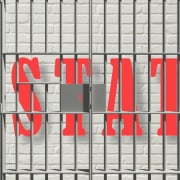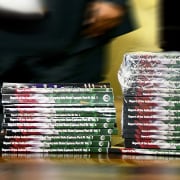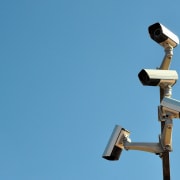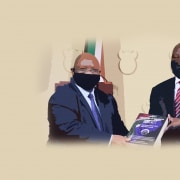The ANC has been putting out fires related to its election candidate list – more particularly, relating to members of the party whose names appear on the list despite corruption and other controversies hanging over their heads.
Secretary-general Fikile Mbalula hosted a media briefing on Monday 11 March, almost a month after a similar engagement where he had promised journalists that the much-anticipated list would be ready in the middle of February. It was delayed, presumably because the resolution to cut off the tainted members was not an easy one to arrive at, especially in an election year. The second press briefing was meant to reassure the public that the party was still committed to upholding ethical standards within its ranks, and that the people on the list were the best placed to take to Parliament.
Among those implicated in the state capture report whose names appear on the list are Malusi Gigaba, Gwede Mantashe, David Mahlobo, and Zizi Kodwa. Mantashe and Kodwa serve in the current administration as Cabinet ministers, while Mahlobo is a deputy minister.
The party has defended its position of including them, saying they were chosen because of what they would bring to Parliament, and in line with electoral rules. The list that was officially released on Monday following an alleged leak from the Independent Electoral Commission system the previous week, shows that the party appears to have ignored its own internal processes in including some of its candidates. The ANC’s integrity commission had recommended that 90 senior members of the party be excluded from public representation.
Despite this, the party released the list which included their names. Mantashe and Kodwa were implicated in the report for having allegedly received undue favours from private companies Bosasa and EOH respectively, both of which were in lucrative contracts with government. Gigaba and Mahlobo were implicated in having abused their power while in office as ministers, interfering in the operational affairs of their departments in both the public enterprises portfolio in respect of Gigaba, and the State Security Agency in the case of Mahlobo.
Civil society response to Zondo commission
Meanwhile, a grouping of civil society organisations that make up the Civil Society Working Group on State Capture last week released a detailed response to the work of the commission, including its findings. The Collective Civil Society Response to the Zondo Commission and the State Capture Report was released following a process of reflections by the individual organisations on the things that the commission got right, and those it got wrong.
“The struggle against state capture and corruption in South Africa is a struggle for human rights,” reads the report. “This is why continued commitment to the implementation of the Zondo Commission’s recommendations and the vigilance of civil society remain important.”
It notes the pivotal findings of the network of high-profile politicians, the private businesses that they largely benefited from, and the public resources that were negligently abused to cover the relationship between the two actors.
“The exhaustive and far-reaching focus of the commission means that its report provides a fairly comprehensive account of state capture and the patterns of corrupt activity that took place at various state-owned enterprises and state institutions.”
The report, available here, further reflects on the climate within which the commission had to work and achieve its objectives, one of political pressure from certain quarters. Despite this, chairperson Chief Justice Raymond Zondo and his team carried out their work with commitment and integrity, ensuring also that the proceedings were always accessible to the public.
With the benefit of hindsight, however, the report said, it was necessary to reflect honestly on the commission’s shortcomings. For instance, matters examined within its scope or terms of reference received uneven attention. While Zondo exhausted multiple elements of some matters, others were underserved.
“There was a disproportionate allocation of time for some witnesses and evidence streams, at the expense of others. While the commission summoned and grilled numerous politicians and public officials in this way, it did not do the same for the numerous chief executive officers of large private companies implicated in state capture.”
The document made several recommendations, including one on budget, citing the need to provide appropriate budgets to commissions of the size and scope of the Zondo commission. That way, they can use the resources provided to them efficiently and process the matters before them expeditiously without having to keep going back to national government for money.
Peters suspension
One small twist in the developments around state capture is President Cyril Ramaphosa’s one-month suspension without pay of Dipuo Peters, the deputy minister of small business. In a statement released recently, the presidency said that the decision followed on a sanction adopted by Parliament’s joint committee of ethics and members interests. The sanction is for Peters’ breach of the code of conduct while she was minister of transport.
Last October, the parliamentary committee found that Peters’ failure to appoint a group CEO at the Passenger Rail Agency of South Africa (Prasa) after it had launched a recruitment process had ultimately cost the entity R1.7-million. The committee found Peters had “failed to act on all occasions with the public trust placed in her” and had failed to discharge her obligations in terms of the Constitution.
When she appeared before the commission in 2021, Peters had also failed to defend her decision not to appoint a CEO for Prasa, which remained leaderless in the period after the departure of Lucky Montana due to what then board chairperson Popo Molefe described as a falling out. She conceded that her decision had been irrational, but said it stemmed from a tense relationship with Molefe’s board.
The suspension runs from 28 February to 28 March 2024.







